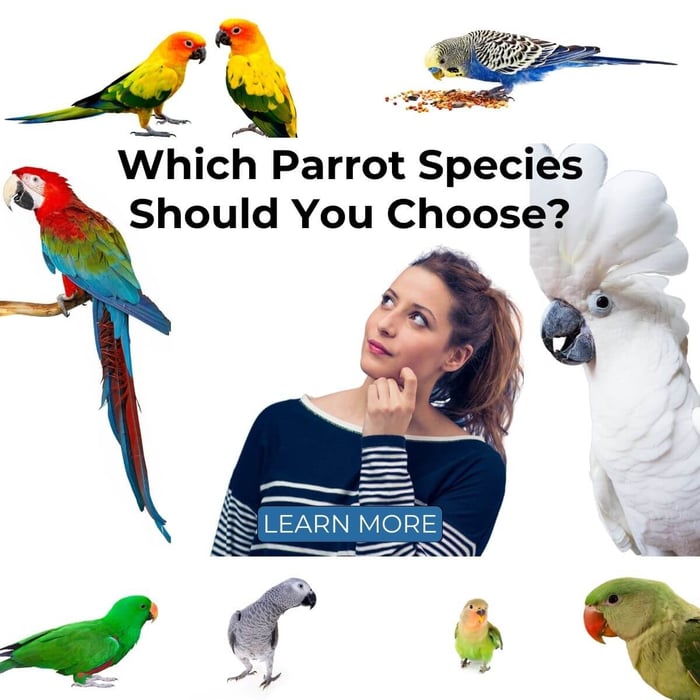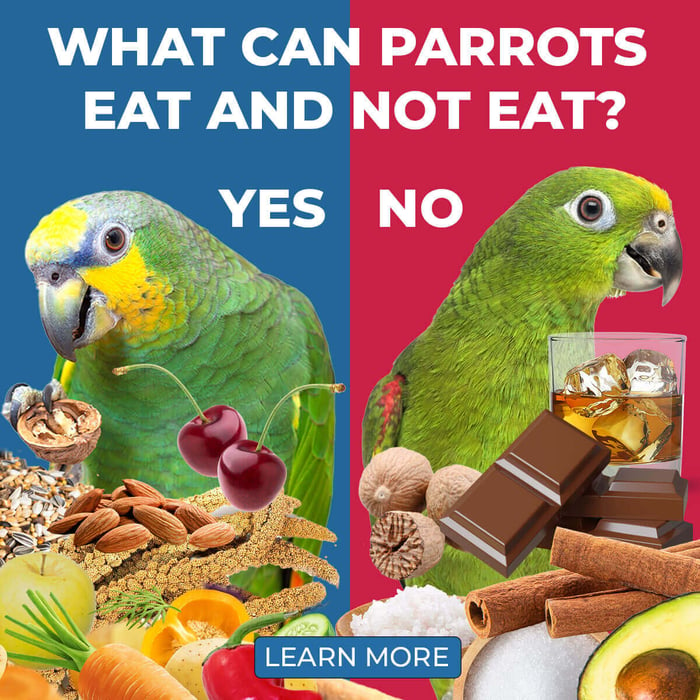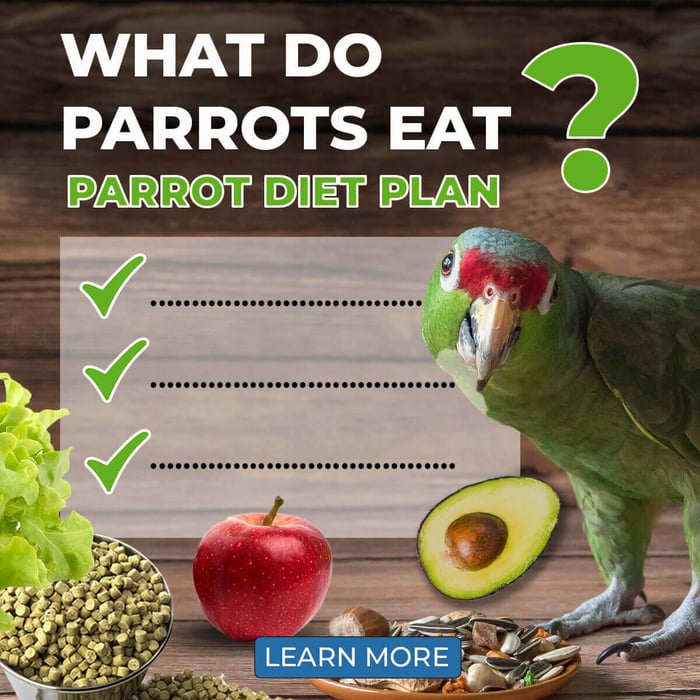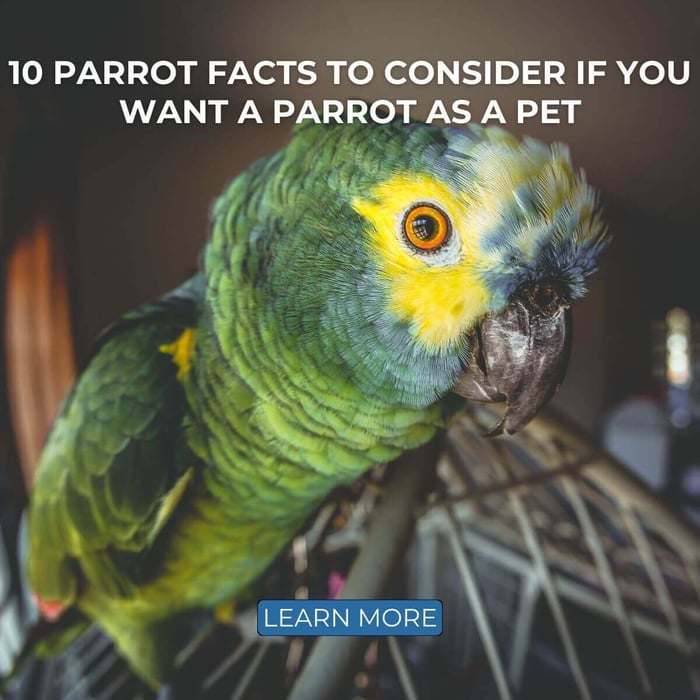What Food Do Parrots Eat?
If you’re thinking of adding a parrot to your family or if you want to make sure your feathered pet is eating the best possible food, you may be wondering: what food do parrots eat?
Parrots are considered omnivores, although they lean towards herbivorism. These birds eat fresh fruit, seeds, nuts, grains, vegetables, and the occasional insect. Given that there are more than 400 species of parrots, some will prefer certain foods to others. For instance, macaws like fruits and budgies are seed eaters, while lorikeets mainly eat nectar.
Let’s have a look at parrots’ nutritional needs and what you can feed your pet bird.
Nutritional requirements of parrots

Vitamin A
For all birds, vitamin A is vital for the proper functioning of the eyes, the growth and repair of tissues, and hearing. A parrot that doesn’t get enough vitamin A may develop faded feathers and scaly feet.
More severe issues will arise if the vitamin A deficiency is left untreated. These include problems with breathing and failure of mucus production in the nasal passage, eyes, and throat. This is why formulated parrot foods contain vitamin A!
Vitamin B
Inadequate levels of vitamin B, specifically vitamin B6 and B12, can interfere with your bird’s ability to digest food and absorb nutrients.
Among other things, vitamin B enables your bird to handle stress during moulting and mating time. These are periods that immensely affect a bird’s overall well-being.
Vitamin D
Birds require relatively large amounts of vitamin D, which aids them in absorbing essential minerals like calcium. Consequently, a shortage of this vital nutrient will result in many health issues. These include reduced egg production, overgrown or soft beaks, bent knees, fractures, and seizures.
Like humans, birds need sunlight to make vitamin D. They do so by secreting oil from the preen gland, which they spread all over their coats while grooming. In the wild, the bird’s feathers will be exposed to sunlight and create vitamin D, which then fulfils their needs.
However, domesticated birds spend most of their time indoors. They don’t get enough sunlight to make adequate vitamin D, and so they need it supplemented by food.
Nutritional requirements of parrots
Calcium
Calcium is essential for your bird’s beak structure and bone formation, plus the proper production of feathers. Studies have also shown calcium plays a role in a bird’s mood, as a lack of it is associated with anxiety.
Remember that calcium and vitamin D go hand in hand. Birds need this vitamin to be able to synthesize calcium correctly!
Protein
Protein directly affects a bird’s muscle and tissue formation. This also means that insufficient protein in the parrots’ diet will decrease muscle tone growth.
A parrot with undeveloped muscles cannot fly or perform other physical activities like climbing. Eventually, it can become lethargic and waste away.
Complete diet for parrots
Historically, parrot owners have mainly raised their birds on dried seeds. Recently, however, awareness has grown about the fact that eating a seed mix only won’t provide these birds with enough nutrients. Dried seeds don’t offer variety, and they’re too high in fat.
So, what should you feed your bird as a staple? Luckily, pet food manufacturers have caught on and started producing complete parrot pellet diets. High-quality pellets are extruded at low temperatures so they don’t lose nutrients, and the ingredients are human-grade and organic.
A parrot pellet diet is a good choice for your bird’s main daily meals but can become a little boring. That’s why you should add plenty of variety using the various options described below!
What fruits can parrots eat

Without a doubt, parrots love fruit. Whether it’s a lovebird, African grey, Macaw, or any other type of parrot, although some may need a little coaxing, they’re all programmed to like it.
Fruits provide the birds with some of the crucial vitamins mentioned before, like Vitamin A, vitamin B2, vitamin B6, fibres, and minerals.
Some of the fruits parrots eat include:
- Papaya
- Mango
- Apple
- Peache
- Banana
- Grape
- Passionfruit
- Pomegranate
- Citrus fruits
- Pear
Although parrots go nuts for fruit, they are very high in sugar and shouldn’t be overdone. Remember to always wash fruit and buy organic if possible to avoid the presence of any pesticides.
Vegetables that parrots eat
Vegetables are ideal sources of important nutrients for parrots, particularly vitamin D. As we’ve already discussed, domesticated parrots need quite a bit of this vitamin in their diet since they don’t usually get adequate sunlight.
Vegetables to safely offer to your bird include:
- Tomato
- Sweet potato
- Courgette
- Sweet corn
- Broccoli
- Butternut squash
- Leek
- Peas
- Beans
- Carrot
- Spinach
- Parsley
- Beet
- Pumpkin
Surprisingly, parrots also like hot peppers. They don’t have the capsaicin receptors that make them taste spicy to us!

Grains, seeds and legumes that parrots eat
Remember how we talked about protein being an important part of parrot diet? One way to make sure your parrot gets a little extra on top of its formulated base diet is to regularly offer some cooked grains and legumes, as well as dried seeds. Legumes, especially, are healthy and high in protein.
Some options you can try are:
- Whole-wheat pasta
- Whole-grain or black rice
- Popcorn
- Dried lentils
- Watercress seeds
- Amaranth
- Safflower seeds
- Sunflower seeds (in moderation, please)
- Canary grass
- Groats
- Quinoa
Remember that seeds are relatively high in fat. Try not to overdo them – or alternatively, sprout them! When seeds are sprouted, much of their fat content is converted into protein, making them into a healthier choice.
Wild foods parrots eat
Did you know that many foraged foods are perfectly fine for parrots to eat? If you have a garden or access to a pollution and pesticide-free location to pick weeds, your feathered pet will much appreciate it.
Try going for:
- Dandelion
- Chickweed
- Various types of grass
- Sow thistle
- Fat hen plant
- Willow branches
- Nuts that parrots can eat
Aside from seeds, nuts are considered a bird’s staple food, especially in the wild. They provide proteins and nutrients such as potassium, zinc, calcium, copper, and magnesium.
Nuts that parrots eat in captivity as pets

Among other nuts, parrots appreciate:
- Brazil nuts
- Cashew nuts
- Almonds
- Hazelnuts
- Walnuts
Do remember that nuts are very high in fat. They’re best used as (training) treats, not as part of your parrot’s daily diet.
You can use whole walnuts or hazelnuts as a means of enrichment. The bird will have to open the shell to get the treat, thereby staying engaged and entertained.
Foods to avoid feeding your parrot
As you’ve hopefully concluded, there is plenty of fresh and healthy food that you can feed your parrot. However, there are also a few items that are toxic to our feathered pets and that you should avoid.
Don’t give your parrot:
- Junk food with high amounts of fat, sugar, and salt
- Alcohol
- Chocolate
- Avocado
- Apple pits
What do baby parrots eat?

Baby parrots can’t break down food like older parrots yet. Hence in the wild, they will eat fruits, vegetables, and seeds that their parents will regurgitate directly into the chick’s beak.
If you need to hand-feed a domestic parrot chick like if the parents rejected it, you can do so using a store-bought baby parrot formula. Follow all the guidelines outlined on the product and use lukewarm water.
Parrot feeding routine
We have looked at what parrots eat and why. Now let’s discuss how often and how much food our birds require. Deciding on the amount of food to offer is tricky since parrots have individual behaviors and preferences regardless of the species.
In the wild, parrots mostly search for food and eat in the morning. They will then spend time playing or napping and then eat some more in the afternoon. This is why many people feed their birds in the morning and evening. In between, you can offer some treats as rewards or training aids.
How much to feed the bird will depend on certain factors. Firstly, assess the amount of food your birds eat naturally. Secondly, keep an eye on what foods they like while observing their weight, behaviour, and overall condition. In essence, you need to know and understand your bird, weighing it regularly.
As an example, if you regularly find food spilled all over the cage, you need to reduce the amount. Clearly, your bird isn’t hungry! On the other hand, if you notice your parrot’s weight has gone down, you can consider increasing the amount a bit.
Remember to offer a variety of foods so that the bird will get all the required nutrients.
Parrot water requirements

Water is required for almost all the processes in your bird’s body; it’s critical to its survival. As a matter of fact, birds need to consume about 5% of their body weight in water daily. This is to replace the amount lost through evaporation, respiration, and waste removal.
You should provide enough clean water and replace it daily. If you fail to do so, your bird will drop food and defecate in it. The dirty water can facilitate the growth of bacteria, which will multiply and cause health issues.
Clean water will keep your bird properly hydrated and prevent diseases.
Why is my parrot not eating?
Illness
If your parrot was previously eating fine and has now started to refuse food, there’s a very good chance something is wrong. Lack of appetite is a common symptom of disease in parrots.
If you’re not sure what’s going on, give your avian vet a ring to ask whether you should bring the bird in.
Stress
A recent change in a parrot’s environment, like moving to a new house, may cause stress. Stress arises because the bird will experience new smells, sounds, and sights that initially may be frightening.
However, after a day or two, the bird should start eating. If you notice no change, then it’s probably time to visit an avian veterinary.
New food they don’t like
Parrots usually have a certain food they like and get accustomed to what they eat regularly. When you introduce a new food, your bird may stubbornly stop eating.
If you want to introduce a new food, do so gradually over a couple of days or weeks. Have a look at the article on switching a parrot to pellet food if you’re not sure how to go about it!
Summary and Recap
Parrots need plenty of nutrients and vitamins like calcium, proteins, vitamin A and vitamin B to thrive. They obtain these nutrients by eating seeds, nuts, insects, fruits, and vegetables.
Domestic parrots should be fed in moderation: offer only what they need and no more. This prevents your bird from being obese and helps ensure it will live a long, healthy life.




